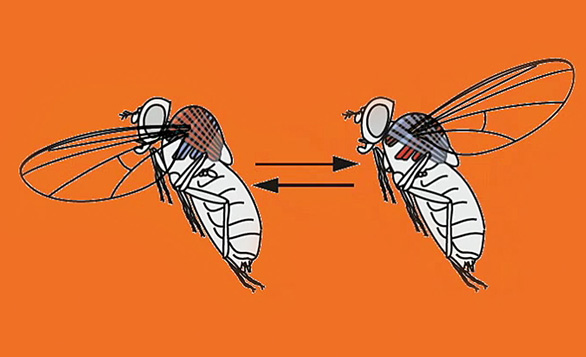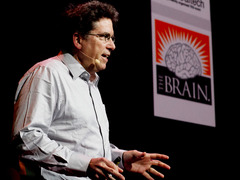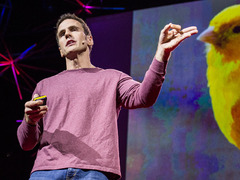 “Raise your hand if you think that basic research on fruit flies has anything to do with understanding mental illness in humans,” David Anderson begins today’s talk, given at TEDxCaltech.
“Raise your hand if you think that basic research on fruit flies has anything to do with understanding mental illness in humans,” David Anderson begins today’s talk, given at TEDxCaltech.
 David Anderson: Your brain is more than a bag of chemicals
While few hands shoot in the air, Anderson goes on to explain the connection — that research conducted by manipulating brain chemicals in fruit flies is giving us valuable insight into the brain circuitry of emotions and mental illness. And these neural underpinnings are more complex than many think.
David Anderson: Your brain is more than a bag of chemicals
While few hands shoot in the air, Anderson goes on to explain the connection — that research conducted by manipulating brain chemicals in fruit flies is giving us valuable insight into the brain circuitry of emotions and mental illness. And these neural underpinnings are more complex than many think.
“We tend to believe — and the popular press aids and abets this view — that [psychiatric disorders] are a chemical imbalance in the brain,” says Anderson. “As if the brain were some kind of bag of chemical soup full of dopamine, serotonin and norepinephrine.”
The brain circuitry of mental disorders are complex, and yet the medications we’ve used to treat them for the past two decades work from a simple model — they treat every part of the brain as if it were the same. This is one of the big reasons that current psychiatric medications don’t work well, says Anderson, and why they have many unpleasant side effects that lead many to avoid them.
Explains Anderson, ”Using them to treat a complex psychiatric disorder is like trying to use engine oil by opening up the can and pouring it all over the engine block—some of it will dribble into the right place, but a lot of it will do more harm than good … What we need to do is use our ingenuity and our scientific knowledge to try to design a new generation of treatments that are targeted to specific neurons and specific regions of the brain that are affected in particular psychiatric disorders.”
Anderson’s lab approaches this challenge in an interesting way — by asking questions like, “How long will a fruit fly stay angry if we inhibit its dopamine system?” To hear how this all works, watch this fascinating talk — a must-see for anyone who has or knows someone with a mental disorder.
Fruit flies, otherwise known as Drosophila, are the workhorse of brain research. Here, a playlist of TED Talks about research with these amazing insects.
 Gero Miesenboeck: Re-engineering the brain
Gero Miesenboeck: Re-engineering the brain
Gero Miesenboeck reengineers a brain Instead of mapping the brain by recording the activity of every neuron — a daunting task — Gero Miesenboeck works the other way around. At TEDGlobal 2010, he shares his reverse engineering approach, revealing how manipulating neurons leads to a clear understanding of what they do. |
 Michael Dickinson: How a fly flies
Michael Dickinson: How a fly flies
Michael Dickinson: How a fly flies From an engineering standpoint, it is incredible that fruit flies are able to lift off, given the size of their bodies and the delicate structure of their wings. In this talk from TEDxCaltech, Michael Dickinson shares the marvel — and how it is made possible by the fly’s nimble brain. |
 Eva Vertes: Meet the future of cancer research
Eva Vertes: Meet the future of cancer research
Eva Vertes looks to the future of medicine At age 17, Eva Vertes discovered a compound that stopped the damage in a fruit fly’s nervous system, caused by heavy metals. Many think this could be a first step toward a treatment for Alzheimer’s. In this talk from TED2005, Vertes walks us through that research, and shares an exciting possibility — that cancer could potentially be used as a treatment. |
 Read Montague: What we're learning from 5,000 brains
Read Montague: What we're learning from 5,000 brains
Read Montague: What we’re learning from 5,000 brains Fruit flies and mice have long been the organisms we use to study the brain. At TEDGlobal 2012, Read Montague shares the tool — fMRI — which is allowing his lab to study thousands of human brains as they interact with each other. |
And some TEDx Talks to watch:
Comments (12)
Pingback: Kalpa Supplier
Pingback: Outreach resources | flyfacility
Pingback: Tips On How To Kill Fruit Flies Fast | SEO Zen Bonus
Pingback: Amid Tensions, Chinese Fruit a Turnoff in Vietnam | eJumo
Pingback: Wizmo Blog » Blog Archive » 7 talks about fruit flies